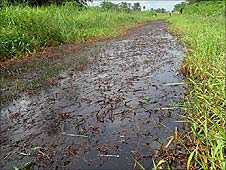
Oil spills in the West African nation of Nigera are frequent and extremely damaging to the national economy., a photo by Pan-African News Wire File Photos on Flickr.
Accusations fly as oil slick hits Nigeria coast
8:39am IST
By Akintunde Akinleye
OROBIRI, Nigeria (Reuters) - Nigerian villagers say oil washing up on the coast comes from a Royal Dutch Shell (RDSa.L: Quote, Profile, Research) loading accident last month that caused the biggest spill in Africa's top producer in more than 13 years.
Shell denies that any of the oil is from its 200,000 barrel per day (bpd) Bonga facility, 120 km offshore and accounting for 10 percent of monthly oil flows, which was shut down by the spill on December 20.
Shell says five ships were used to disperse and contain the spill and that this kept any oil from washing ashore.
But local villagers, as well as environmental and rights groups, dispute this account, saying the oil is still at large, coating parts of the coast, killing fish and sparking protests.
On Saturday, a Reuters team visited two of 13 villages whose residents say they were affected by the spill in the steamy swamps of the Niger Delta. In both, there were stretches of beach coated in a film of black sludge with a rainbow tint.
In one, two children skipped along the beach, dodging the puddles of sticky ooze.
Villagers in Orobiri, Delta state, spent much of the day scooping crude from the water in plastic buckets and jerrycans.
"When this spill occurred, we called on Shell to come and do a clean up, ... but since then, they have not turned up, so we the communities now did a clean-up instead," said Jacob Ajuju, the paramount chief of Orobiri village, surrounded by rows of assorted buckets and containers full of crude.
As he spoke, dozens of women villagers marched in protest at the spill, their heads adorned with leafy branches to symbolise unhappiness. Others continued to tip the oil from jerrycans into large plastic drums.
"On Christmas day, all the women you see here, were just at the seaside parking this oil into the jerrycans," said Dennis Igolobuabe, Orobiri community youth president.
"NOT OUR OIL"
Shell says no oil from the spill washed up on the coast.
"We believe the oil on the beach is not from Bonga. We made significant progress every day to disperse the oil that leaked from Bonga," Shell Nigeria spokesman Precious Okolobo told Reuters in an emailed statement.
"We are confident that any oil of that age, colour and consistency that hits the beach is not ours. We are taking samples ... which will be reviewed to provide evidence that this is not Bonga oil on the beach," he added.
Okolobo suggested the oil may have been from "a third party spill which appeared to be from a vessel, in the middle of an area that we had previously cleaned up".
Spills by all oil companies operating in the region are common, and it is sometimes hard to tell whose is whose.
On another beach near Agga village, a man on a motorbike paused to look at scores of silvery fish washed up dead.
"Before this spill came, we were already been informed by Shell in Warri (the main town in the region) during a meeting that this is what is coming ... It's a calamity," said Joseph Gbuebo, community secretary for Agga.
"On the 25th of this month, we saw some helicopters flying, dropping some chemicals along the shore, but this has been injurious to our health," he added.
Shell's pipelines in Nigeria's onshore Niger delta have spilled several times. The company usually blames such leaks on sabotage attacks and rampant oil theft.
BP's (BP.L: Quote, Profile, Research) Macondo well in the Gulf of Mexico ruptured in April last year, spewing nearly 5 million barrels of oil into the sea in what was the worst U.S. marine oil spill. The disaster brought intense negative publicity for BP.
But in Nigera, spills are so commonplace they often go unnoticed by the outside world.
Bonga had been due to load around 161,000 bpd on five tankers in January, according to oil loading programmes, and its closure has boosted prices for other Nigerian crude grades.
A U.N. report in August criticised Shell and the Nigerian government for contributing to 50 years of pollution in a Niger Delta region that it said needs the world's largest oil clean-up, costing an initial $1 billion and taking up to 30 years.
(Additional reporting and writing by Tim Cocks in Abuja; Editing by Alistair Lyon)
No comments:
Post a Comment